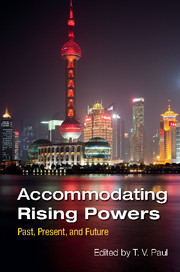Book contents
- Frontmatter
- Contents
- List of figures
- List of contributors
- Acknowledgments
- Part I Mechanisms of accommodation
- 1 The accommodation of rising powers in world politics
- 2 Realism, balance of power, and power transitions
- 3 Globalization, interdependence, and major power accommodation
- 4 What would E.H. Carr say? How international institutions address peaceful political change
- 5 The responsibility to accommodate: ideas and change
- Part II Historical cases
- Part III Contemporary cases
- Part IV Conclusions
- Index
4 - What would E.H. Carr say? How international institutions address peaceful political change
from Part I - Mechanisms of accommodation
Published online by Cambridge University Press: 05 March 2016
- Frontmatter
- Contents
- List of figures
- List of contributors
- Acknowledgments
- Part I Mechanisms of accommodation
- 1 The accommodation of rising powers in world politics
- 2 Realism, balance of power, and power transitions
- 3 Globalization, interdependence, and major power accommodation
- 4 What would E.H. Carr say? How international institutions address peaceful political change
- 5 The responsibility to accommodate: ideas and change
- Part II Historical cases
- Part III Contemporary cases
- Part IV Conclusions
- Index
Summary
While therefore resort to war for the purpose of altering the status quo now usually involves the breach of a treaty obligation and is accordingly illegal in international law, no effective international machinery has been constituted for bringing about changes by pacific means.
E.H. CarrE.H. Carr is invariably described as the father of twentieth-century realism. As often happens to seminal writers, he is also misremembered, his writings reduced to a handful of aphorisms. Carr is forever the enemy of the utopians, the critic of Woodrow Wilson's fourteen points and the League of Nations’ folly. This trend is not helped by the fact that his main opus, The Twenty Years’ Crisis, has grown scarce on graduate syllabi. The fashion these days leans toward the work of Carr's fellow early realist, Hans Morgenthau, who put forward a more systematic treatment of some of the ideas he shared with Carr.
Carr's topic was peaceful change. As he claimed, “to establish methods of peaceful change is therefore the fundamental problem of international morality and of international politics.” The main complaint that emerges from The Twenty Years’ Crisis is over the lack of some “international machinery,” as per the epigraph to this chapter, that might enable change by peaceful means. Carr's writings are thus highly germane to the set of questions being asked in this volume.
Writing in the interwar period, Carr was preoccupied by how the rise of an emerging power might be dealt with without resorting to war. The first notable point, then, is that he did not see conflict as an inevitable outcome of even large-scale political change. His view was also thoroughly modern in this respect: he saw conflict as an inefficient means of reallocating resources and settling disagreements among states. Yet the futile attempts to legislate war through the League of Nations represented for him a utopia, that is, “an ideal to be aimed at, though not wholly attainable.”
It may thus surprise some to reread the note on which The Twenty Years’ Crisis ends. The hard-nosed realist revealed himself to have had hope for a solution. One that, by his own admission, also has a distinct utopian quality.
- Type
- Chapter
- Information
- Accommodating Rising PowersPast, Present, and Future, pp. 70 - 86Publisher: Cambridge University PressPrint publication year: 2016
- 1
- Cited by

